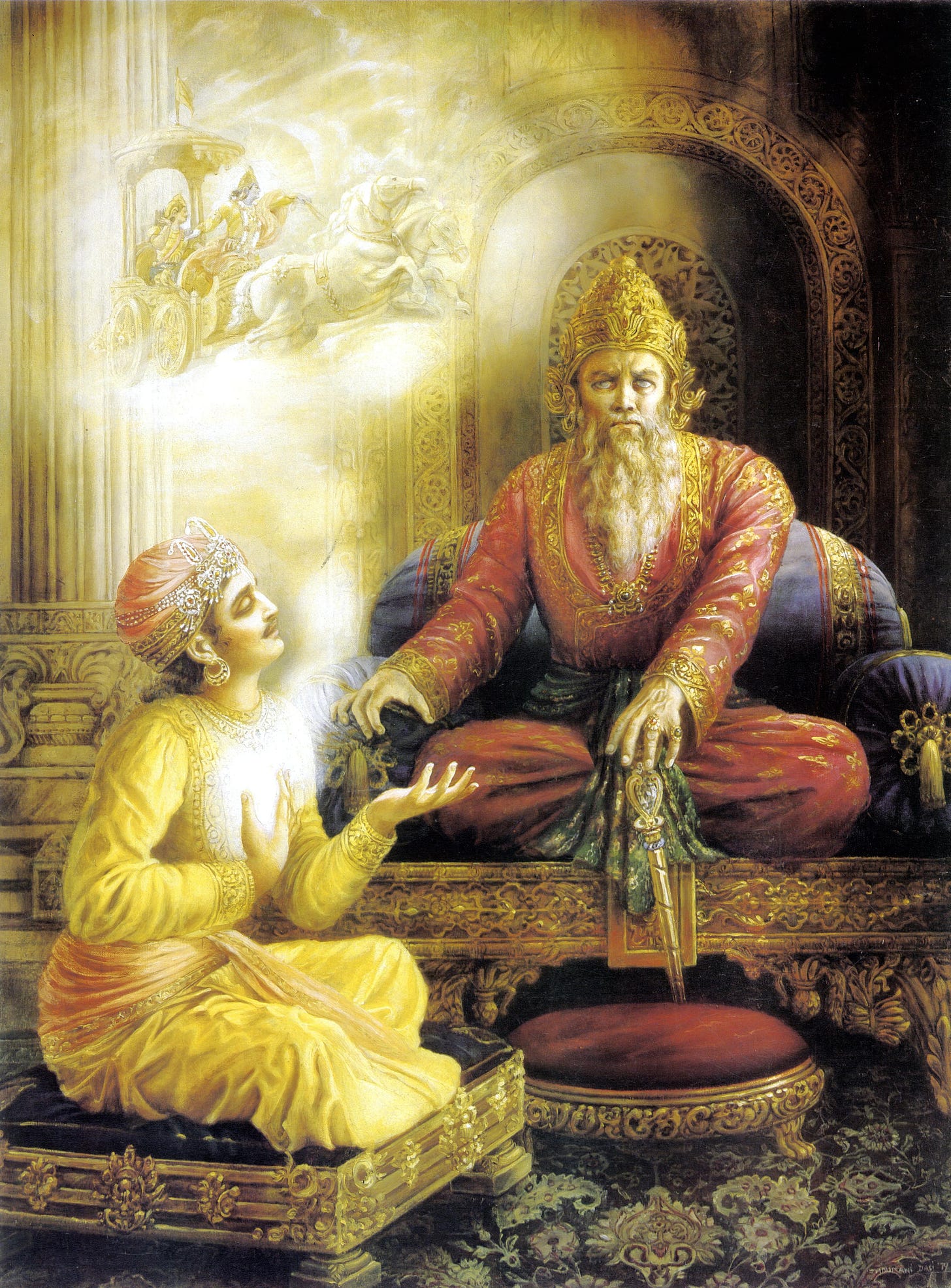Descendant of Bharata (Bg 2.10)
Dhṛtarāṣṭra is a descendant of the third Bharata, the son of Mahārāja Duṣmanta and Śakuntalā, who lived closer to our times, appearing in the dynasty of Pūru.
« The Song of God: An in-depth study of the Bhagavad-gītā (Volume 1)
Verse 10: tam uvāca hṛṣīkeśaḥ, prahasann iva bhārata
senayor ubhayor madhye, viṣīdantam idam vacaḥ
O descendant of Bharata, at that time Kṛṣṇa, smiling, in the midst of both the armies, spoke the following words to the grief-stricken Arjuna.
Just like Arjuna, Dhṛtarāṣṭra is also a descendant of the powerful Bhārata Maharaja, therefore, Sañjaya addresses him as such. Sañjaya is the secretary and servant of Dhṛtarāṣṭra, therefore, his relationship with Him is very respectful. Srila Prabhupada explains that there are three Bhāratas. The first Bharata is the brother of Lord Rama, and the second is the son of Ṛṣabhadeva, who became attached to the deer and had to take two more births before going back to Godhead. This second Bharata was so famous that our planet became known as Bhārata-varṣa, named after him. Before, it was known as Ilāvati-varṣa.
Dhṛtarāṣṭra is a descendant of the third Bharata, the son of Mahārāja Duṣmanta and Śakuntalā, who lived closer to our times, appearing in the dynasty of Pūru. Srila Prabhupada tells his story in the 9th canto of Srimad Bhagavatam:
"While hunting in the forest, Duṣmanta once approached the āśrama of Mahāṛṣi Kaṇva, where he saw an extremely beautiful woman and became attracted to her. That woman was the daughter of Viśvāmitra, and her name was Śakuntalā. Her mother was Menakā, who had left her in the forest, where Kaṇva Muni found her. Kaṇva Muni brought her to his āśrama, where he raised and maintained her. When Śakuntalā accepted Mahārāja Duṣmanta as her husband, he married her according to the gāndharva-vidhi. Śakuntalā later became pregnant by her husband, who left her in the āśrama of Kaṇva Muni and returned to his kingdom.
In due course of time, Śakuntalā gave birth to a Vaiṣṇava son, but Duṣmanta, having returned to the capital, forgot what had taken place. Therefore, when Śakuntalā approached him with her newly born child, Mahārāja Duṣmanta refused to accept them as his wife and son. Later, however, after a mysterious omen, the King accepted them. After Mahārāja Duṣmanta’s death, Bhārata, the son of Śakuntalā, was enthroned. He performed many great sacrifices, in which he gave great riches in charity to the brāhmaṇas."
Many descriptions of the Mahabharata describe Duṣmanta as passing the throne to an outsider, instead of his sons, but from this story, we can see that Bhārata was also his son, and he chose him because of his exceptional qualifications. The Srimad Bhagavatam describes that as a child, he was so powerful that he would capture a lion and play with it, just as one may play with a cat. He was a partial expansion of the Lord and had the mark of the Lord's Sudarśana Cakra on his right hand, as well as the mark of a lotus on his feet. He performed fifty-five horse sacrifices on the banks of the Ganges, and seventy-eight on the banks of the Yamunā, and performed many heroic activities, which put him on the same level as the Bhārata son of Ṛṣabhadeva. Because of him, the name Bhārata-varṣa was reinforced, being related to both kings.
In the Bhagavad-gītā, Krsna refers to Arjuna as the descendant of Bhārata in several verses, such as 2.18, 2.30, 4.7, etc., emphasizing his exalted lineage.
Main points in the purport of Srila Prabhupada:
"O descendant of Bhārata, at that time Kṛṣṇa, smiling, in the midst of both the armies, spoke the following words to the grief-stricken Arjuna."
a) Originally, Arjuna was a friend of Krsna, and thus, in terms of relationship, they were on the same level. Krsna is always superior to everyone, but he agrees to become a friend, son, or lover out of affection.
b) Krsna was smiling because his friend Arjuna had agreed to become a disciple. Having accepted the role of spiritual matter, however, He prepared to talk with gravity. Talks between master and disciple are serious.
c) The talk happened in the middle of both armies, so everyone could benefit from it. This shows the universal nature of the Bhagavad-gītā. Friends or enemies are equally entitled to hear.
« The Song of God: An in-depth study of the Bhagavad-gītā (Volume 1)


